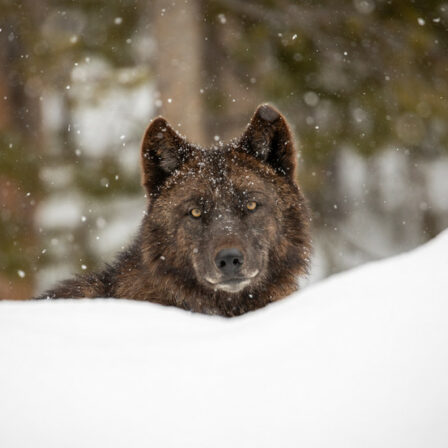Administration Announces Withdrawal of Old-Growth Logging Plan

 The Secretary of the Interior Ken Salazar announced July 17 that the Bureau of Land Management will withdraw a controversial logging plan affecting federal forests managed by the Bureau of Land Management in Oregon. The Secretary also announced that decisions by the previous administration to reduce designated critical habitat and establish a recovery plan for the Northern Spotted Owl were also being reversed. A new Northern Spotted Owl recovery plan will now be developed.
The Secretary of the Interior Ken Salazar announced July 17 that the Bureau of Land Management will withdraw a controversial logging plan affecting federal forests managed by the Bureau of Land Management in Oregon. The Secretary also announced that decisions by the previous administration to reduce designated critical habitat and establish a recovery plan for the Northern Spotted Owl were also being reversed. A new Northern Spotted Owl recovery plan will now be developed.
These are important steps forward toward conserving Northern Spotted Owls, Marbled Murrelets and other threatened species. This is a big win for conservation groups, the environment, and the global climate. The decision assures that the vast storehouse of carbon contained in these mature and old-growth forests will be not be released into the atmosphere had they been logged.
The Western Oregon Plan Revisions (WOPR) would have tripled old-growth logging on federal forests in Oregon managed by the Bureau of Land Management (BLM), reducing habitat for the threatened Northern Spotted Owl and Marbled Murrelet, as well as impacting threatened wild-salmon stocks. An estimated 680 known Spotted Owl sites and 600 Marbled Murrelet sites would have been eliminated over the course of the plan’s implementation.
This decision highlights the importance of Endangered Species Act consultation and of using the best available science in decision-making, free of political interference. The WOPR did not undergo consultation under Section 7 of the Endangered Species Act, whereby the U.S. Fish and Wildlife Service and National Marine Fisheries Service would review the plan’s impacts on endangered species. As a result, the Secretary announced that the WOPR was legally indefensible and must be withdrawn. The Secretary also cited political interference in the development of the owl recovery plan as a major factor in that plan being withdrawn and redone.
The importance of mature and old-growth forests as a carbon storehouse was underscored by a new National Academy of Science study https://www.pnas.org/content/106/28/11635.full.pdf which found that the forests of the Pacific Northwest hold a globally significant carbon store that should be preserved. The study affirmed that “Conserving forests with large stocks of biomass from deforestation and degradation avoids significant carbon emissions to the atmosphere.”
Many groups and individual activists were involved in bringing about these policy changes. Activists on the ground monitoring and challenging harmful projects; analysts reviewing plans and preparing comments; organizers getting members to send comment letters and calling lawmakers; lawyers and plaintiff groups who brought two separate legal challenges; and advocates in DC urging that the administration to the right thing. Our thanks to the administration for doing the right thing for the Northern Spotted Owl, Marbled Murrelets, salmon and the global climate, and to everyone in our community who helped make this happen including the Endangered Species Coalition and its members who supported the effort.
Steve Holmer
American Bird Conservancy
Part of an occasional series of guest blog posts from the member organizations of the Endangered Species Coalition. For more information about our coalition members, visit www.stopextinction.org



0 comments on “Victory for Spotted Owl, Marbled Murrelets and Ancient Forests”